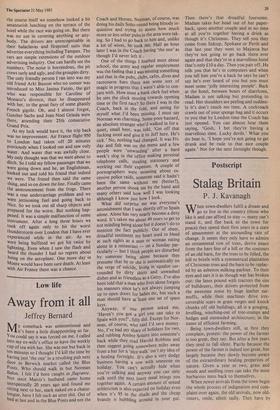Postscript
Stalag Britain
P. J. Kavanagh
When town-dwellers fulfil a dream and go to live in the country (those who like it and can afford to stay — many can't stand it, and flee back to the town for peace) they spend their first years in a state of amazement at the astounding rate of change. It seems they only have to admire an ornamental row of trees, derive peace from the bare line of a hill or the contours of an old barn, for the trees to be felled, the hill to bristle with a symmetrical plantation of Christmas trees and the barn to be replac- ed by an asbestos milking-parlour. To their eyes and ears it is as though war has broken out: the lanes pound with tractors the size of bulldozers, their drivers protected from the awesome noise by huge leather ear- muffs, while their machines drive irre- coverable scars in grass verges and knock chunks off old buildings; all is a gouging, levelling, winching-out of tree-stumps and hedges and outmoded architecture; in the name of efficient farming.
Being town-dwellers still, at first they complain, protest: the power of the farmer is too great, they say. But after a few years they tend to fall silent. Partly because the power of the farmer is indeed too great, but largely because they slowly become aware of the extraordinary healing properties of nature. Given a year or two, grass and weeds and seedling trees can take the most barbarous mess back to themselves.
When newer arrivals from the town begin the whole process of indignation and com- plaint over again, the old arrivals, now old- timers, smile, albeit sadly. They have by this time learned some of the patience of country people. Besides, they know that
complaining to farmers is like complaining to vivisectionists about unnecessary ex- periments on animals: Oh, say the latter, so you want to halt the advance of medicine? Oh, say the farmers, so you don't want cheap food? It takes more patience and dedication than most possess to keep poin- ting out that it is all a matter of degree, a question of drawing the line at lunacy. I was once foolish enough to suggest, in print, that it was unwise to take out quite so many hedges; an unwisdom now, I think, general- ly accepted. For weeks afterwards the postman's van was weighted to the axles with outraged letters from farmers, at least one challenging me to physical combat.
There are good ones of course, but it has to be admitted that the reputation of farmers is generally not high; they are figures of dread, in fact. One local friend of mine spotted an elderly couple picnicking on one of those dreadfully scarred verges. He had just finished gathering his hay, so he hastened towards them, on his tractor, to invite them to take their picnic in his new-cut meadow. When they saw him ap- proach they packed up their thermos flasks and folding chairs in terror, threw them in- to the boot of their car and fled.
I am going to stick my head above the green parapet for one last time. Not about farmers; I am too old a hand for that; about stone walls. Dry-stone walls are, or were, a glory of this part of England as they are of many other parts, Derbyshire for in- stance, and Yorkshire. Round here they are falling down and their sad jumble patched with barbed wire.
I will be told that these stone walls are precisely what people like myself complain- ed about a hundred.years ago: they marked the enclosure of the common land. True, or sometimes true; but they are beautiful, and useful (they limit drifting snow, for a start), and grow lichen and moss; barbed wire does none of these things.
It is a matter of money. A rural council has been quoted as saying, two or three years ago, that a new dry-stone wall cost £86 a yard. But mending walls would not cost a farmer anything like that; they have the labour and usually have the stone from buildings they have knocked down. Nevertheless, barbed wire is cheaper. My suggestion is this: could they not be en- couraged to maintain their walls; be given (yet another) grant? Most of them would like to do it were it economic. Would anyone who has ever enjoyed old stone walls write to the Countryside Commission, or any other body (except me) suggesting this? If landscape changes quickly in the country, thought does not. The farmers are not a bad lot but they are still in the grip of 18th-century rationalism; whereas before it was their Bibles, it is now their ledgers that tell them true.
It is not quite too late. But imagine your favourite piece of farming country with nothing but barbed Stalag fences stretching for miles. Imagine walking in it.











































 Previous page
Previous page